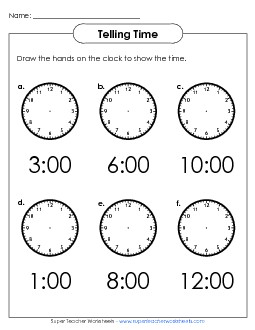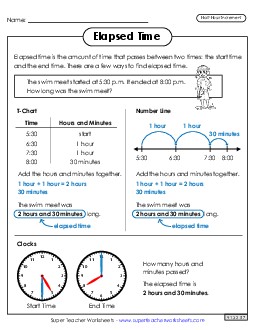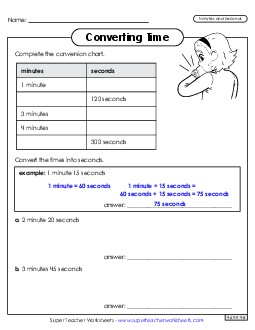Time Worksheets

These basic telling time printables have clocks with times shown in hours only. (example: 2:00, 3:00, 4:00)
Time (Hours and Half Hours)The teaching resources on this page have clocks with times in hours and half hours. (example: 4:30, 5:00, 5:30) Includes worksheets, task cards, cut-out clocks, and more.
Time (Nearest Five Minutes)These activities have times to the nearest five minutes. (examples: 12:35, 11:40, 3:05) Includes cut-out clocks, a foldable origami game, an "I have... Who has.." game, and many worksheets.
Time (Nearest Minute)This page has teaching resources with time to the nearest minute. Includes an "I have... Who has..." game, task cards, and several worksheets.
Elapsed TimeThis page has a selection of elapsed time worksheets, including word problems and charts.
Time ConversionWith the worksheets on this page, students will practice converting between days, hours, minutes, seconds, and even years, decades, and centuries.
Calendars (Math)Learn about days, months, years, and calendars. Also, practice elapsed time on calendars.



Super Teacher knows that learning to tell time is a critical skill taught in elementary school, often introduced in first or second grade and reinforced in later years. Understanding time involves learning how to read both analog and digital clocks, as well as recognizing the relationships between hours, minutes, and seconds. As students progress, they also learn about larger time units, such as days, weeks, months, and years, which help them grasp how time is organized in everyday life. Additionally, students are introduced to more complex concepts like calculating elapsed time and converting between different time units, skills that are essential for practical problem-solving and planning.
In the classroom, teachers use a range of interactive methods to teach students about time. Visual aids like large classroom clocks, both analog and digital, help students see how time is represented on different types of clocks. Hands-on activities such as manipulating clock models, timing simple tasks, or creating schedules encourage students to practice reading and calculating time in a fun, engaging way. Word problems involving elapsed time, such as determining the duration of events or calculating how much time remains until a given activity, help students apply their skills to real-world scenarios. Additionally, educational apps and games focused on time-telling provide valuable practice, reinforcing lessons in an interactive, enjoyable manner.
Understanding how to read clocks and calculate time correctly is vital for a child's overall development. Time is an integral part of daily life, and mastering the ability to read both analog and digital clocks ensures that students can manage their schedules, meet deadlines, and participate in time-based activities. Being able to calculate elapsed time and convert between units of time strengthens students’ math and logical reasoning skills. Mastery of time concepts not only supports academic success but also builds practical life skills, preparing students to handle time management tasks effectively as they grow older. Super Teacher Worksheets' time printable worksheets and free learning materials can provide a huge help in the learning process!






